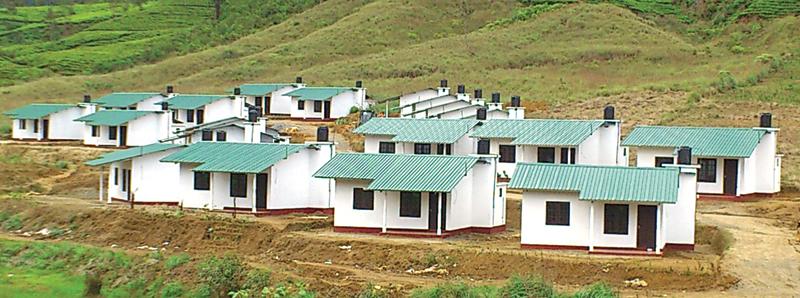
The National Unity Government’s program of granting ownership of single houses and seven perches of land to plantation workers will take off on October 29, Sunday, marking a watershed in their long-aggrieved life as a socially isolated community. President Maithripala Sirisena and Prime Minister Ranil Wickremesinghe together with Minister of Hill Country New Villages, Infrastructure and Community Development, Palani Thigambaram will hand over the title deeds, to 3,000 plantation families at the Dunbar Grounds in Hatton, rolling out the second phase of the Government’s far-sighted national program on transforming the estates into villages, and making plantation workers legal owners of their dwellings on par with other villagers, Minister Thigambaram told the Sunday Observer. Under the inaugural phase of the program, President Sirisena handed over title deeds of 71 newly-constructed houses to workers of Fenkaton Division of Hauteville Estate, Agrapathana in the Nuwara Eliya District on February 9, 2017 , he said.
 In September 2016, on his initiative, a Joint Cabinet memo that was submitted together with the Ministers of Plantation Industries & Lands on granting ownership rights for 71 houses and 7 perches of land for plantation workers was approval by the Cabinet, but it was subject to certain conditions. Consequently, the process of issuing “Haritha Boomi” title deeds, bestowing ‘possessional right of the land ‘ to the residents in the plantations - both workers and non-workers - was started, but, this process was not continued, Thigambaram said.
In September 2016, on his initiative, a Joint Cabinet memo that was submitted together with the Ministers of Plantation Industries & Lands on granting ownership rights for 71 houses and 7 perches of land for plantation workers was approval by the Cabinet, but it was subject to certain conditions. Consequently, the process of issuing “Haritha Boomi” title deeds, bestowing ‘possessional right of the land ‘ to the residents in the plantations - both workers and non-workers - was started, but, this process was not continued, Thigambaram said.
The main problem encountered so far in mainstreaming the plantation community has been granting them ownership rights of houses in which they have been living for generations, or the new houses built for them, and thus changing their captive labour status to free labour,status. This situation is now phenomenally changing, Minister Thigambaram said.
The promise made in the ‘Mahinda Chintana’ 2006 to provide “ a plot of land to each plantation family and support them to stand on their own like any other citizen who owns property “ was not fulfilled in the following years ( 2006 to 2010) of the previous regime . Again, in the Vision for the Future – 2010, this promise was rephrased as “One of my major goals is to make the plantation community a house owning society. Accordingly, instead of the present ‘ line rooms’ every plantation worker family will be the proud owner of a new home with basic amenities, by year 2015”.
This again had gone with the wind. But, the same promise made by the present government is now seeing the light of day and the plantation workers will become ‘proud owners of their own homes’ in the coming years, political observers commented.
India has already contributed 14,000 houses towards the plantation housing program. In the past, under several housing programs, around 31,000 single houses have been built inter-alia under a concessional long-term loan basis. Of them, around 3,900 house owners have paid their loans. During the 100 day program, 1,098 house owners were provided with possessional deeds, according to Ministry records.
Minister Thigambaram also apprised the Sunday Observer of another landmark program his Ministry is now implementing to address the widely prevalent malnutrition among plantation children. The program to effectively address malnutrition among the plantation children was started from the 1st of this month.
Malnutrition among plantation children has been a subject of discussion for many years, among many political and civil society leaders, but nothing was done to address the issue, he said. Under this program, all plantation children in the age group of 3- 5 get three days in a week, the condensed nutritional food “Tikiri Sakthi” , an edible food bar with a high concentration of protein and other nutrients, including peanuts.
The nutrition pack costs Rs.10 million per month and will continue for the next five years, Minister Thigambaram said. It will be issued through the Child Development Centers (CDCs) in the plantations. On his initiation, the proposal was formulated by the Plantation Human Development Trust (PHDT) , which is under the purview of his Ministry, and has been approved by the Cabinet, the Minister said, adding that the PHDT is the implementing agency of the program with funding from his Ministry.
Director General, PHDT Lal Perera, explaining the background of the program said, socio-economic factors and eating habits of the plantation community contributed largely to malnutrition among the community, especially, their younger generation, and Minister Thigambaram very much wanted to address this problem considering the future well-being of the community. Consequently, they formulated the proposal in consultation with all leading nutritionists and biscuit manufacturing companies, and, with everyone volunteering to help, they finally decided on the “Tikilri Sakthi” as the best.
The program is being implemented, while the approval of the Ministry of Health, Nutrition & Indigenous Medicine has been sought, he said. The plantation people habitually eat hastily prepared and overcooked food, so the PHDT would conduct food programs periodically among the communities to educate them on the proper way of cooking to preserve the nutritional value of the food.
The PHDT will also distribute saplings of edible fruit bearing trees, such as, guava, pears, avocado, apple, mandarin, etc. suitable to the hill country climate, for planting in their home gardens , Lal Perera said.
